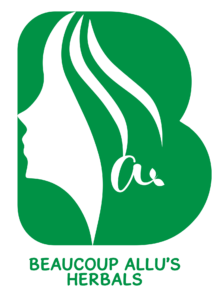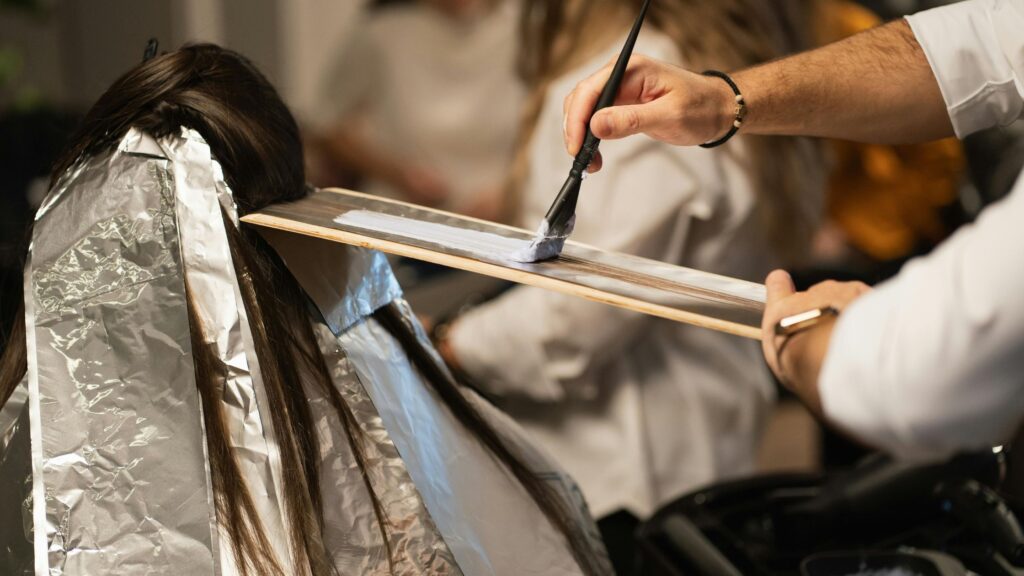Having your hair coloured or chemically straightened may cause dryness, thinning and can even make your colour fade over time. They take away the oils in your hair, weakening it and making it easier to damage. After hair treatment, looking after your locks depends on a routine that helps them stay hydrated, well-fed and protected. Nature-derived compounds found in herbal hair care products are gentle and help soothe your hair and scalp. Moisturising hair, lowering hair fall and keeping the natural hair colour are benefits from using aloe vera, hibiscus, amla and Bhringraj.
Your hair care will improve if you add natural herbal remedies. Both aloe vera and hibiscus help you achieve softer, more vibrant hair. If your hair is dull, amla will freshen it and Bhringraj will rebuild and improve its health underneath. Herbal oils, shampoos that are made without sulfates and natural masks are great choices for restoring your hair and stopping more harm from happening. Picking herbal products for your hair helps retain your colour or protects your hair, all naturally.
Understanding Colored & Treated Hair
Any use of colour, bleach, straightening or perming may significantly change the structure of your hair. The process removes the cuticle layer to make it possible for the colour or chemicals to get into the cortex. The desired results may be achieved, but this kind of transformation strips moisture away, softens the hair and exposes the strands to damage from the sun, outside pollution and heating tools.
Due to the changes from dyes and chemicals, treated and coloured hair naturally needs special care. Since hair can become unhealthy in winter, you should add moisture, strengthen it and use products that keep your colour from fading. Chemical-based products can do more harm, so taking care of your hair with herbal or natural products is needed to hold onto your hair colour for longer.
Why Choose Herbal Hair Care for Colored Hair?
Using special herbal hair products takes advantage of natural healing properties to maintain healthy, full hair, especially for those people with coloured or chemically treated hair. Naturally found products like aloe vera, amla, hibiscus, bhringraj and neem are found to have essential ingredients like vital vitamins, antioxidants and nutrients. They deeply support the scalp, giving extra strength to hair roots and leave the hair moisturised without risk of extra damage. In addition, they help make hair less likely to break and continue to add natural texture and colour while making your hair healthier.
Since commercial hair care products usually have sulfates, parabens, sodium chloride and petrochemicals,they take away colour from your hair, dry the hair out and irritate the scalp. Opting for herbal hair care means you’re looking after your treated hair and also using a chemical-free way that helps your scalp and hair feel and look their best.
Essential Natural Ingredients for Colour-Treated Hair
Colour-treated hair should be washed with products that hold onto its vibrance and protect as well as condition the hair.
Hibiscus – Moisturises and Strengthens the Hair
Hibiscus is rich in amino acids and vitamin C, it keeps your hair from becoming rough and helps prevent breakage. This shampoo provides hydration to coloured hair and keeps it feeling soft and stretchy. Using hibiscus can lead to thick, smooth and matte-free hair while brightening your roots.
Read: Benefits of applying hibiscus gel
Brahmi – Repairs and Rejuvenates the Hair
Brahmi is widely recognised for calming and revitalising the scalp. It works to heal hair that has been ruined by chemicals by providing nutrition to the roots. Caring for your hair after treatment is important and that’s where Brahmi comes in. It makes hair follicles stronger, helps stop split ends and returns vigour to lifeless hair.
Coconut Milk – Deep Nourishment for Hair
The protein and fatty acids found in coconut milk are good for your hair. Colouring and chemicals can damage your hair, but using this conditioner can fix it. Massaging your hair with coconut milk will stop frizz, give it a smooth texture and keep it hydrated.
Rose Essence – Enhances Shine, Protects Colour of Hair
Rose essence adds shine to your hair and helps to preserve any colour you have applied. Thanks to its antioxidants, this oil protects hair from stress caused by the environment, so it looks bright and smooth. Moreover, it nourishes the scalp with scented cologne.
Meadowfoam – Prevents Colour Degradation of Hair
The oil at the hair root forms a barrier that holds in moisture and locks the hair’s colour. By including antioxidants, the shampoo shields your hair from UV light and hot hair processes, keeping it colourful for longer.
Monoi Oil – Repairs and Conditions the Hair
It’s made from coconut oil infused with Tahitian gardenia flowers, monoi oil is famous for its luxurious conditioning. It reaches down inside the hair to fix any harm, make it smoother and make it feel softer. Monoi oil prevents hair breakage and keeps coloured hair shining.
Avocado Oil – Hydration and Shine for Hair
Avocado oil is full of vitamins A, E, D and essential fatty acids, all of which moisturise your hair from the root to the tip. It gives dry hair water, improves its flexibility and pairs this with a lovely shine without making the hair feel heavy.
Shea Butter – Intense Moisture and Softness for Hair
Shea butter effectively moisturises dry and brittle hair because it’s a great emollient. It closes the hair’s outer layer, makes it easier to retain moisture and lets the hair look less frizzy. Applying shea butter helps the hair of those with dyed locks become softer, shinier and more resilient.
Herbal Hair Care Products for Colored & Treated Hair
Sulfate-Free Shampoos and Conditioners
Colour-treated hair will look healthier and shinier if you use sulphate-free shampoo and conditioner. Since they do not destroy balancing oils or change your hair colour, they are unlike most other shampoos. Herbal extracts aloe vera, hibiscus and amla, these products help your hair stay moisturised, look healthier, keep its colour and become easier to manage.
Herbal Hair Masks and Deep Conditioners
Herbal hair masks and deep conditioners help chemically treated hair get the deep nourishment it needs. Oil treatments regularly consist of powerful ingredients, including both coconut milk and avocado oil, as well as brahmi and shea butter which can restore dried hair, provide moisture and help strengthen it. Hair masks used only once or twice per week can reinvigorate colour-treated locks, prevent baldness and maintain the healthiest possible texture and shine.
Ayurvedic Head Massage Oils for Scalp Health
Steady application of bhringraj, brahmi or amla-infused head massage oils is good for your scalp and gives your hair a boost. The use of these oils for massage helps maintain good blood supply, relaxes the mind and supports the health of hair at its root, all beneficial for strong, healthy hair. Using warm oil helps moisturise and soothe dry or flaky areas on the scalp caused by chemicals, so it’s good for both scalp and hair.
Best Herbal Hair Care Routine for Chemically Treated Hair
Gentle Cleansing
Wash your hair every 2–3 days using lukewarm or cool water, so you don’t remove your oils or make your hair colour fade. Use shampoos made from herbs that are free from sulfates and keep your hair from drying out. Stay away from hot water, since it can cause the colour in your hair to fade prematurely.
Weekly Deep Conditioning and Herbal Masks
Once or twice a week, try deep conditioning or herbal hair masks to add moisture and nutrients back into your hair. Apply products containing coconut milk, shea butter, hibiscus or avocado oil to healed hair and ensure it stays nourished, bright and healthy.
Minimal Heat Styling & Use of Heat Protectants
Try to keep the use of heat styling tools down, as using them often can cause more damage to treated hair. When using heat, make sure to spray a natural or herbal heat protectant on the hair to defend it from split ends and dryness.
UV and Sun Protection for Hair Colour
Frequent sun exposure can make your hair colour fade and may weaken your hair. Either apply hair products with UV sunscreens or shield your hair with a hat or scarf while you’re outside. Coconut or monoi oil found in nature can act as a light sun barrier, while at the same time helping your hair retain moisture and colour.
Regular Trims and Touch-Ups
Set appointments every 6–8 weeks to have your stylist remove the split ends in your hair. If you colour your hair, keep up with touch-ups on your roots and never forget to deep condition your hair after using hair chemicals to help your hair balance and restore strength.
Ingredients & Products to Avoid for Colored & Treated Hair
Sulfates (SLS/SLES)
You can find Sodium Lauryl Sulphate and Sodium Laureth Sulphate in most shampoos because they are very harsh detergents. Though they can lather well, they often cause the hair to become dry, prone to frizz and rob its colour quickly. If your hair has been coloured, use products that are made without sulfates.
Parabens
Parabens are chemicals used to stop cosmetics and hair care products from spoiling quickly. Even so, they might upset the natural balance of your scalp and irritate sensitive spots. For those with treated hair, paraben-free products are safer in the long run.
Sodium Chloride (Salt)
Even though salt is often used to thicken shampoo, it can leave hair drier and weaker, mostly in coloured or keratin-treated hair. Sodium chloride may irritate your scalp and make your hair treatments fail more quickly.
Petrochemicals and Synthetic Fragrance
Using ingredients from petroleum such as mineral oil and paraffin, can prevent moisture and healthy nutrients from reaching your hair and scalp. Synthetic smells, produced using a mix of chemicals the company does not always disclose, may irritate your allergies. Choose products scented with essential oils that are natural.
DIY Herbal Hair Care Tips for Colored & Treated Hair
Simple Homemade Hair Masks
Applying homemade herb-infused masks to your hair is safe and helpful for coloured locks. Many people like blending fresh hibiscus petals with coconut milk to create a mask. Rub the shampoo onto your scalp and hair, wait 30 minutes and then wash it off with cool water. The mask leaves hair deeply moisturised, thicker and healthier looking.
Herbal Rinses for Shine and Color Protection
Shampooing with herbs can give your hair a beautiful shine and help stop colour fading. Combine two equal parts of rose water and aloe vera juice and finish your hair wash by splashing it on after rinsing with water. Using green tea as a final rinse helps close off your cuticle for strong and shiny locks. Rinses done one or two times each week can deliver good results.
Key Takeaway
Herbal care for your hair helps you keep your hair beautiful and healthy, whether it is coloured or treated. Thanks to hibiscus, brahmi, coconut milk and monoi oil with a proper herbal hair care routines you can rehydrate your hair, prevent fading and repair damage without using any strong chemicals. These unique features of botanicals improve your hair’s strength, radiance and vibrancy without harm for the long run.
By embracing a gentle, natural hair care routine, you not only preserve your hair colour but also support overall scalp and strand health. Switching to sulfate-free shampoos, using herbal masks, and avoiding synthetic additives can transform your hair care experience. Make the shift toward herbal solutions today — your hair will thank you with lasting softness, resilience, and radiant colour.


